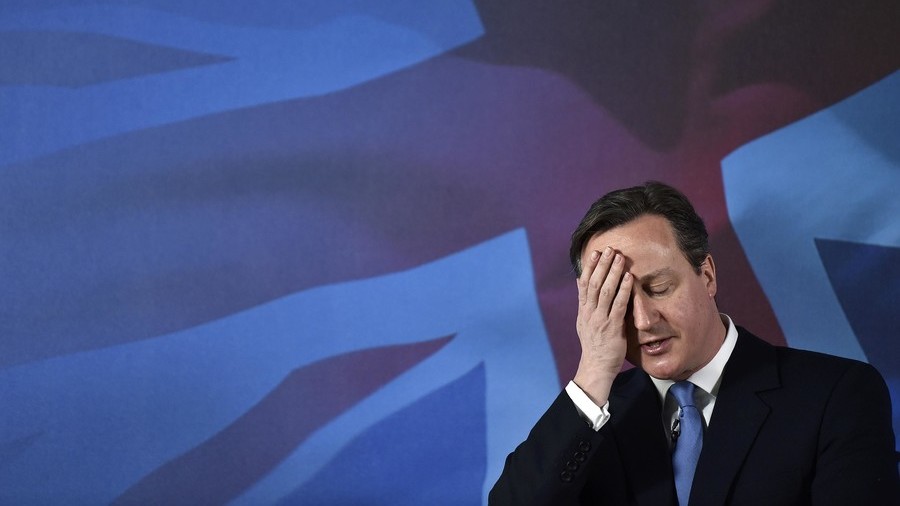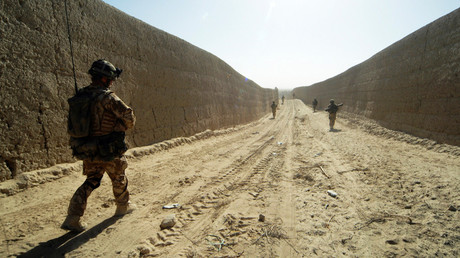David Cameron, foreign secretary? That would be a sick joke for Libyans, Syrians & many others
Neil Clark is a journalist, writer, broadcaster and blogger. He has written for many newspapers and magazines in the UK and other countries including The Guardian, Morning Star, Daily and Sunday Express, Mail on Sunday, Daily Mail, Daily Telegraph, New Statesman, The Spectator, The Week, and The American Conservative. He is a regular pundit on RT and has also appeared on BBC TV and radio, Sky News, Press TV and the Voice of Russia. He is the co-founder of the Campaign For Public Ownership @PublicOwnership. His award winning blog can be found at www.neilclark66.blogspot.com. He tweets on politics and world affairs @NeilClark66

Former UK PM Cameron is reportedly ‘bored s***less’ and wants to return to politics, preferably as foreign secretary. Remainers, who blame him for Brexit, are furious – but he did a lot worse than that when he was at Number 10.
According to the Sun, the politician known colloquially as ‘Call me Dave’ wants to step back into the limelight and rather fancies the job of foreign secretary.
What could possibly go wrong?
Well, quite a lot actually. Just consider Cameron’s record in foreign affairs when he was prime minister. In 2011, after less than a year in office, he – along with his NATO allies – was bombing Libya back to the Stone Age. The country which had the Highest Human Development Index in the whole of Africa was transformed into a failed state and jihadist theme park right on the shores of the Mediterranean.
The repercussions of the Libyan intervention have been enormous. It triggered a refugee crisis of Biblical proportions, and destabilized an entire region. In neighboring Tunisia in 2015, 30 British holidaymakers were among the 38 tourists brutally gunned down on the beach and in their hotel by a terrorist who had reportedly trained in an Islamic State (IS, formerly ISIS) camp in ‘liberated’ Libya. The relatives of the bereaved decided to sue the tour operator, but shouldn’t they have pursued claims against Cameron and his government for creating the conditions for terrorism to thrive?
The same applies to the relatives of the 22 people – more than half of them children – killed in the Manchester Arena attack in May 2017. The suicide bomber, Salman Abedi, and his father were part of the anti-Gaddafi Libyan Islamic Fighting Group, which was used by the UK authorities as part of their regime-change operation. Salman was even rescued from Libya by the Royal Navy.
“Both David Cameron, then Prime Minister, and Theresa May – who was Home Secretary in 2011 when Libyan radicals were encouraged to fight Gaddafi – clearly have serious questions to answer,”says author and security expert Mark Curtis.
At the time, of course, the bombing of Libya was promoted as an absolutely necessary ‘humanitarian intervention’ by the endless-war lobby. Muammar Gaddafi was going to massacre the inhabitants of Benghazi. Something had to be done!
But five years later, in September 2016, the truth finally came outcourtesy of the House of Commons Foreign Affairs Committee.
“The proposition that Muammar Gaddafi would have ordered the massacre of civilians in Benghazi was not supported by the available evidence,” their report declared.
As if Libya wasn’t bad enough, Cameron then turned his attentions to Syria, another independent country with oil that the neocons didn’t like much. He backed the violent ouster of the secular, Christian-protecting government of Bashar Assad, regardless of the consequences.
At a time of great austerity at home, Cameron’s government miraculously found enough money to give aid to ‘rebels’ fighting the Syrian government. Cameron tried and narrowly failed to get Parliamentary support for attacking the Syrian government directly in August 2013. Had he succeeded, Al-Qaeda and its affiliates would probably now be in charge of the whole of the country – using it as base to plan further attacks on Western civilians.
Yet it’s not what he did to Libya and Syria and the international ‘blow-back’ which angers most of the former PM’s liberal-left critics, but his calling of a referendum on Britain’s EU membership. In fact, Cameron on this one had little choice. People forget that in the 2014 European Elections, the staunchly Eurosceptic UKIP topped the national poll – a result which the Guardian quite correctly called a “political earthquake.”
It was the first time in over a hundred years that a party other than the Conservatives or Labour had come out on top. Cameron knew that unless he offered an ‘In-Out’ referendum on the EU, UKIP would prevent the Tories from retaining power in the next election.
He had to do something to get disaffected Tory voters back. And it worked, because in the 2015 general election, Cameron led his party to victory. He would have been confident that he would be able to ‘wing’ the EU referendum, as he had done the Scottish Independence referendum in 2014. But he got the shock of his life when the result went the ‘wrong way’ and his time as prime minister was over.
Of course, we can’t be sure that Cameron really wants to be foreign secretary – as the report was, after all, in the Sun. But even if it’s not true, there’s a very important point to be made. Tony Blair is widely and quite properly regarded as a war criminal for what he did to Iraq. Cameron though has received nowhere near the same level of opprobrium. People still post pictures of their selfies with him, which they don’t do with Blair. That’s unfair, because if anything, Cameron was worse than ‘The Blair Creature’, as he came after him. ‘Call Me Dave’ saw what had happened to Iraq, but still went on and did the same to Libya.
Not that we weren’t warned how he’d turn out.
Back in 2005, while other political pundits were drooling over a man they wanted us to believe was a compassionate, modernizing, One Nation Conservative in the mould of Harold Macmillan, a lone voice in the UK MSM said, “Be very careful!” In the Guardian, on October 23, 2005, in an article entitled ‘Cameron is no moderate’,
I drew attention to the Tory leadership hopeful’s neocon connections and where they might lead us. I noted how Cameron’s campaign was backed by signatories to the statement of principles of the Henry Jackson Society, which was most definitely not a good sign.
“Those not enamoured by the prospect of a regressive tax system, a revival of 1980s economics, a hostile attitude to Europe or British participation in military invasions of Iran, Syria or any other country the US decides to attack in five or six years’ time are well advised to read the small print,” I wrote.
Six years later, the US was attacking Libya, with full British participation.
Cameron did his job. We don’t want him back.
Follow NeilClark @NeilClark66 and @MightyMagyar




0 Comments:
Post a Comment
Subscribe to Post Comments [Atom]
<< Home